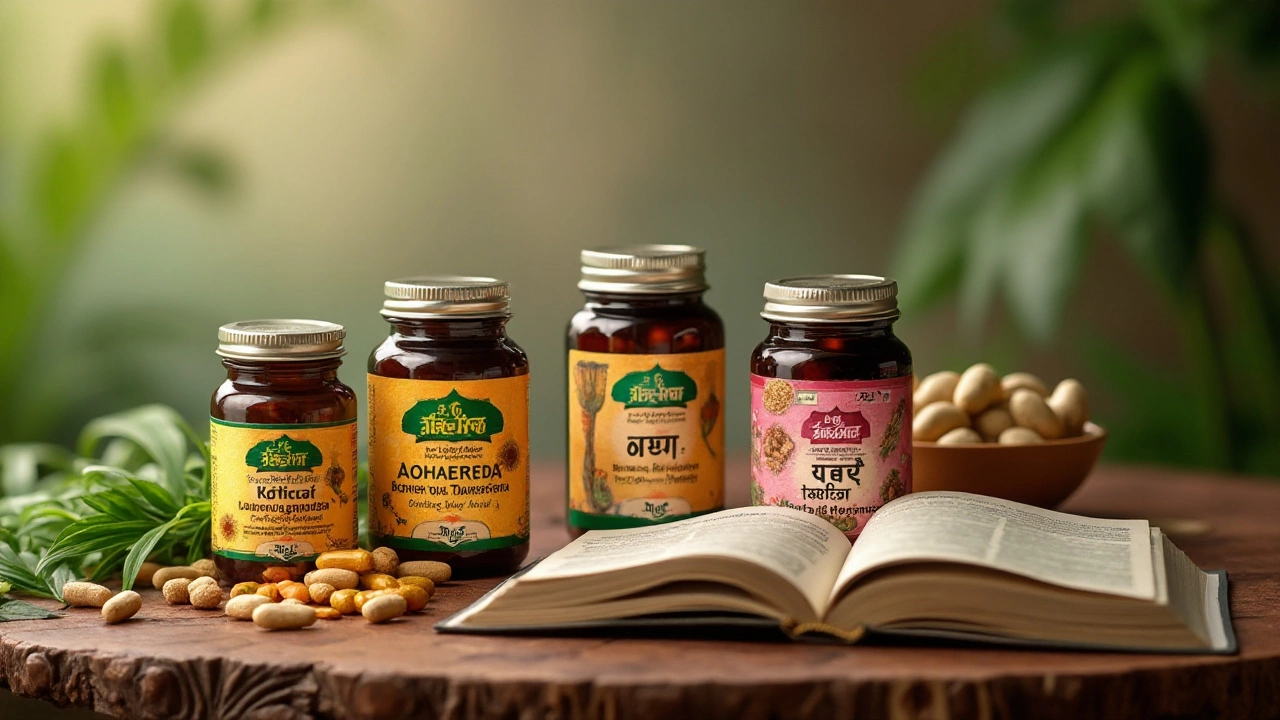The appeal of herbal supplements has grown immensely in recent years, as more people turn to natural alternatives for enhancing their health and well-being. With shelves lined with colorful bottles boasting various health claims, it becomes crucial to ask: do these supplements really work?
Exploring the truth behind herbal supplements involves digging into history, understanding scientific research, and hearing from those who have reaped—or missed out on—the benefits. There's no shortage of information out there, but how much of it is reliable? This article aims to equip you with the facts and insights required to navigate the world of herbal remedies wisely.
- Understanding Herbal Supplements
- Historical Context and Popularity
- Scientific Evidence Behind Herbal Remedies
- Potential Benefits and Known Risks
- Popular Herbal Supplements and Their Uses
- Tips for Choosing the Right Supplements
Understanding Herbal Supplements
In the ever-evolving landscape of wellness and health, herbal supplements have carved out a significant niche. Unlike synthetic pharmaceutical products, these supplements derive from plants, promising nature's own solutions to a myriad of ailments. But understanding herbal supplements requires more than just knowing their names or what they claim to do; it's about getting to grips with their origins, their compositions, and how they interact with our bodies.
At their core, herbal supplements are made from botanical sources and can come in various forms like capsules, teas, extracts, powders, or tablets. They have been part of human healthcare for thousands of years, with ancient cultures relying heavily on their medicinal properties. From the use of echinacea by Native American tribes to ginseng in Chinese medicine, the historical roots of these natural remedies form a rich tapestry that continues to influence modern practices.
The appeal of herbal supplements is often linked to their natural origin—a belief that what is natural is inherently safe. However, it’s important to remember that natural does not always mean harmless. For instance, the popular herb St. John’s Wort is known for its antidepressant properties but can interact adversely with other medications, reducing their effectiveness. So, delving deeper into these natural remedies reveals a complex picture that requires careful consideration, especially when it comes to safety and efficacy.
Scientific investigation into herbal supplements has been increasing, yet it remains a challenging field. The lack of standardized testing procedures and regulations in the industry can sometimes make it difficult for consumers to separate genuine from exaggerated claims. For example, while milk thistle is widely touted for liver health, evidence is still inconsistent. It’s crucial to rely on findings from respected research bodies or consult healthcare professionals knowledgeable in alternative medicine when considering integrating these supplements into one’s health regimen.
"For every patient that benefits from herbal supplements, there may be another person experiencing untoward effects due to lack of oversight and standardization," Dr. Jane Perry, a renowned herbal medicine researcher, once commented in a landmark study on herbal supplements.
This intricate balance between nature, science, and trust underscores why understanding herbal supplements is both fascinating and essential. As consumers, the obligation is on us to be informed, discerning, and thoughtful in our choices. Being proactive rather than reactive can significantly impact how we approach natural remedies in our daily lives.
Historical Context and Popularity
The use of herbal supplements is steeped in a rich tapestry of history that spans centuries and cultures. Since ancient times, our ancestors relied on the natural world to heal and enhance their bodies. The Egyptians noted for their advanced knowledge, recorded herbal remedies on papyri, using plants like myrrh and aloe vera for healing. Meanwhile, traditional Chinese medicine has integrated herbs like ginseng and ginger into comprehensive healthcare systems, a practice that continues robustly to this day.
Across continents, Ayurveda, the age-old practice from India, has long considered plants such as turmeric and neem as vital components for maintaining balance within the body and promoting longevity. Even in Europe, during the Middle Ages, monasteries served as repositories of herbal knowledge, playing a pivotal role in preserving and expanding the understanding of these natural remedies. The Renaissance period saw the codification of these remedies into texts like the English physician Nicholas Culpeper's 'Complete Herbal.'
The popularity of natural remedies experienced a resurgence in the 20th century, aligning with the broader health and wellness movements. Some argue that this rise in interest coincides with a growing skepticism toward pharmaceuticals and an increasing reliance on alternative options. As more people sought to reconnect with traditional approaches, the herbal supplement industry blossomed, evolving into a multi-billion dollar market worldwide. In the United States alone, this industry continues to grow, with consumers spending billions annually.
"Herbs are a gift from the earth; their application, a craft honed over millennia," says renowned herbalist Rosemary Gladstar, underscoring the deep connection between humanity and nature.
Today's consumers are drawn to the perceived natural benefits of herbal supplements, influenced by factors such as increased awareness about health and the ongoing integration of complementary medicine into conventional healthcare practices. The iconography of herbs—images of lush green fields, vibrant botanicals, and artisanal preparation processes—further fuels their allure. People often perceive these products as safer and more harmonious with their bodies, free from the synthetic origins of many modern medications.
Herbal effectiveness is often highlighted in marketing campaigns, emphasizing ancient legitimacy and traditional wisdom. As people become more proactive about their health choices, the demand for comprehensive information about these ancient yet continually evolving remedies grows. Whether driven by cultural heritage or contemporary wellness trends, the historical context of herbal supplements undeniably plays a substantial role in their enduring popularity. With them, the blend of the past and the present provides fertile ground for continual exploration and understanding in the vast landscape of alternative medicine.

Scientific Evidence Behind Herbal Remedies
When we talk about the scientific assessment of herbal supplements, it's important to note that this field is both vast and intricate. Research has been conducted on a variety of herbs for decades, with some studies showing promising results, while others cast doubt on the efficacy of certain remedies. For instance, a well-known review published in the 'Journal of Clinical Pharmacy and Therapeutics' pointed out that many supplements lack rigorous clinical trials to back their medicinal claims. From ginseng, often taken to improve energy and cognitive function, to echinacea, believed to boost the immune system, the evidence ranges from supportive to skeptical.
One of the critical challenges scientists face is the standardization of herbal medicine. Unlike pharmaceutical drugs, herbs can vary significantly in their potency depending on the source, plant part used, and preparation method, making consistent study results harder to achieve. The placebo effect, too, plays a significant role in alternative medicine; some might feel better simply because they believe in the treatment's power. A randomized, double-blind study featured in 'Phytotherapy Research' suggested that St. John's Wort had effects comparable to prescription antidepressants for mild to moderate depression, though it did not significantly outperform a placebo in more severe cases. This finding underscores the need for ongoing investigation and caution in interpretation.
Researchers have sometimes succeeded in pinpointing bioactive compounds within herbal supplements that do influence physiological processes. For example, turmeric's active ingredient, curcumin, has been examined extensively for its anti-inflammatory and antioxidant properties. Curcumin has shown potential in improving symptoms of arthritis and reducing inflammation markers in the bloodstream. Yet, its effectiveness depends heavily on proper formulation to enhance bioavailability. In certain cases, curcumin combined with piperine, a compound found in black pepper, can boost absorption significantly.
While positive study outcomes offer hope, experts urge consumers to be wary of bold claims not substantiated by science. As noted by Dr. Elizabeth Williamson, an expert in pharmacognosy,
"While some herbal medicines have substantial data to justify their use, many do not. It is crucial for consumers to look beyond the superficial marketing promises."The reliance on herbs should be balanced with conventional medicine, especially when tackling serious health conditions.
Innovations in technology and methodology give researchers new tools to explore the potential of herbs with greater precision. Advances in genomics and metabolomics allow scientists to map out the molecular interactions herbs have within the human body. These developments might well usher in an era of precise, targeted natural remedies that harness the full potential of herbal medicine. For now, though, individuals are encouraged to consult healthcare professionals before adding herbal supplements to their regimen, aligning traditional wisdom with scientific insight.
Potential Benefits and Known Risks
Many believe that herbal supplements offer a treasure trove of benefits. People use them to address everything from minor ailments to major health concerns. The idea of treating one's body with nature's offerings gives a sense of comfort and hope. For instance, St. John's Wort is often sought as a natural mood enhancer, reputed for its potential to alleviate symptoms of mild to moderate depression. Similarly, Echinacea is cherished by many looking to boost their immune system, especially during cold and flu season.
Even though the market is flooded with claims of miraculous outcomes, it's important to remember that not all herbs are made equal. For example, green tea extract is well-regarded for its antioxidant properties and potential weight loss benefits. But exceeding recommended dosages may lead to liver problems. Such duality highlights the necessity of approaching herbal remedies with a balance of optimism and caution. On the positive side, ginger is famed for its anti-inflammatory qualities and ability to ease nausea, often recommended by practitioners for those who experience motion sickness or morning sickness, with minimal known side effects.
Be Aware of Side Effects
The promising allure of natural remedies makes it easy to overlook the possible risks. Some popular herbs interact unfavorably with prescription medications. For instance, ginkgo biloba, although used to enhance memory and cognitive speed, can cause bleeding issues when taken with blood thinners like warfarin. Similarly, people with certain pre-existing conditions, such as liver ailments, need to be particularly cautious.
"A reliance on herbal treatments without proper knowledge can sometimes cause more harm than good," warns Dr. Emily Smith, a renowned herbal medicine researcher.Safety in herbal usage largely depends on the consumer's informed choices and understanding of potential effects.
Navigating the Sea of Supplements
Given the widespread use and varied effects, choosing the right herbal supplements requires careful thought. The key is to stay educated and vigilant. Consulting healthcare professionals before starting any herbal regimen can prevent adverse interactions and offer guidance on appropriate dosages. It's essential to look for scientific support; herbs like valerian, used for sleep disturbances, have some studies backing their efficacy, while others, such as kava, require more regulatory scrutiny. Being aware of certified brands is also crucial since the supplement industry isn't tightly regulated, leading to variability in product quality and purity.

Popular Herbal Supplements and Their Uses
The world of herbal supplements is vast and varied, boasting a range of plants each with its unique set of health promises. One of the frontrunners in this universe is Echinacea, a flower renowned for its immune-boosting properties. Many people turn to Echinacea believing it can ward off colds or reduce their duration. While evidence is mixed, a substantial amount of users swear by its preventative capabilities, suggesting some tangible benefit exists. Then there's Ginkgo Biloba, known for its potential to enhance cognitive function. Originating from one of the oldest living tree species, Ginkgo is often marketed as a memory aid, particularly appealing to those eager to maintain mental sharpness as they age.
According to the National Center for Complementary and Integrative Health, “Research using large and well-designed studies has yielded mixed results about the efficacy of Ginkgo Biloba in improving memory and cognitive speed.”Such insights help temper expectations while highlighting the need for personal experimentation with these natural remedies.
Tumeric is another staple in the herbal world, prominently recognized for its anti-inflammatory properties thanks to its active ingredient, curcumin. Many users integrate turmeric supplements into their daily regimen to help manage joint pain or stave off inflammation-related ailments. However, it's worth noting that curcumin is not easily absorbed by the body, so formulations often include black pepper to enhance its bioavailability. Meanwhile, St. John's Wort offers a herbal alternative for those managing mild to moderate depression. Widely used in Europe, this plant has shown promise in influencing mood by boosting serotonin levels. Yet, it's crucial to exercise caution, as it interacts with numerous medications, potentially leading to unwanted side effects.
A plethora of options cater to digestive health as well. Ginger, cherished for its culinary versatility, is also a favorite among herbal enthusiasts seeking relief from nausea or digestive upset. Its efficacy has been supported by some scientific backing, providing comfort for expecting mothers or those dealing with motion sickness. Another digestive aid is peppermint, often taken in capsule form to help alleviate symptoms of irritable bowel syndrome (IBS). Peppermint oil relaxes the gastrointestinal tract lining, providing natural relief for many sufferers. Yet, as with all alternative medicines, results can vary greatly among individuals.
While herbal supplements captivate interest, it is crucial to approach them thoughtfully. Ashwagandha, for example, has gained attention for its potential in reducing stress and anxiety. As an adaptogen, it may help the body manage stress, thereby promoting general well-being. Interest in adaptogens like ashwagandha underlines a growing desire for natural remedies in tackling the pressures of modern life. But as these examples suggest, relying solely on supplements without consulting healthcare providers or conducting personal research can lead to mismatches between expectation and outcome. The diverse profiles and uses of these herbal supplements offer a testament to the complexity and individual nature of health and wellness journeys.
Tips for Choosing the Right Supplements
Embarking on the journey of incorporating herbal supplements into your daily regimen can be both exciting and daunting. With a multitude of choices available, understanding how to select the right product is crucial to achieving the desired health benefits. Firstly, it's important to prioritize quality over quantity. Not all supplements are created equal, and opting for those that originate from reputable manufacturers can make a significant difference. These companies often adhere to stricter guidelines and perform rigorous testing to ensure that their products are safe and effective. Additionally, consulting reliable sources, such as studies and expert opinions, can help guide your selection process. Transparency plays a huge role; look for products that provide clear labeling and detailed information about ingredients and their origins.
Another factor to consider is your personal health needs and goals. Different herbs are known to offer varying benefits; for example, ginseng is often used to improve energy levels, while chamomile is popular for its calming effects. Understanding your body's specific requirements and recognizing the herbal effectiveness tied to each supplement aids in making informed choices. It’s beneficial to engage in conversations with healthcare professionals, who can provide tailored advice based on your medical history and current health status. They can alert you to possible interactions with medications and prevent unnecessary risks. It's also worth researching the evidence supporting the use of each herbal supplement to ensure that there is legitimate backing for their claimed benefits.
Verify Certification and Quality
Certified supplements offer an added layer of assurance when it comes to safety and purity. Look for products that have been certified by independent organizations such as NSF International or the United States Pharmacopeia (USP). This certification typically means that the supplement contains the ingredients listed on the label, without harmful contaminants. Beware of supplements that promise magical cures; if it sounds too good to be true, it probably is. Relying on such claims may lead to disappointment or worse, adverse health effects. Instead, choose supplements backed by science and approved by respected health authorities.Pay attention to dosage recommendations. Each natural remedy you're considering should come with suggested dosages, and it’s critical to adhere to these guidelines. Overconsumption can lead to undesirable side effects or negate benefits. For those new to herbal supplements, starting with a lower dosage and gradually increasing, as advised, might be the best course of action. Moreover, it’s helpful to pay attention to any changes in how you feel after beginning a supplement regimen, noting any positive shifts or potential side effects to discuss with a healthcare provider. Einstating a journal to monitor your progress might offer insights into the efficacy of the supplements and their alignment with your wellness objectives.
"Not all supplements are alike—diligent research, careful selection, and ongoing monitoring are keys to safely embracing their benefits," advises Dr. John Anderson, a nutrition expert with two decades of experience in natural medicine.
Lastly, remain skeptical about the latest trends and advice circulating on the internet without scientific backing. Fads come and go, but your health is paramount. Seek information from authoritative health websites and peer-reviewed journals to navigate the vast sea of advice available. It’s easy to get swept up in convincing marketing, but a discerning eye can help steer you clear of baseless advice and hone in on truly beneficial choices. With careful consideration and wise decision-making, integrating alternative medicine through the right herbal supplements can support and enhance your path to a healthier life.








